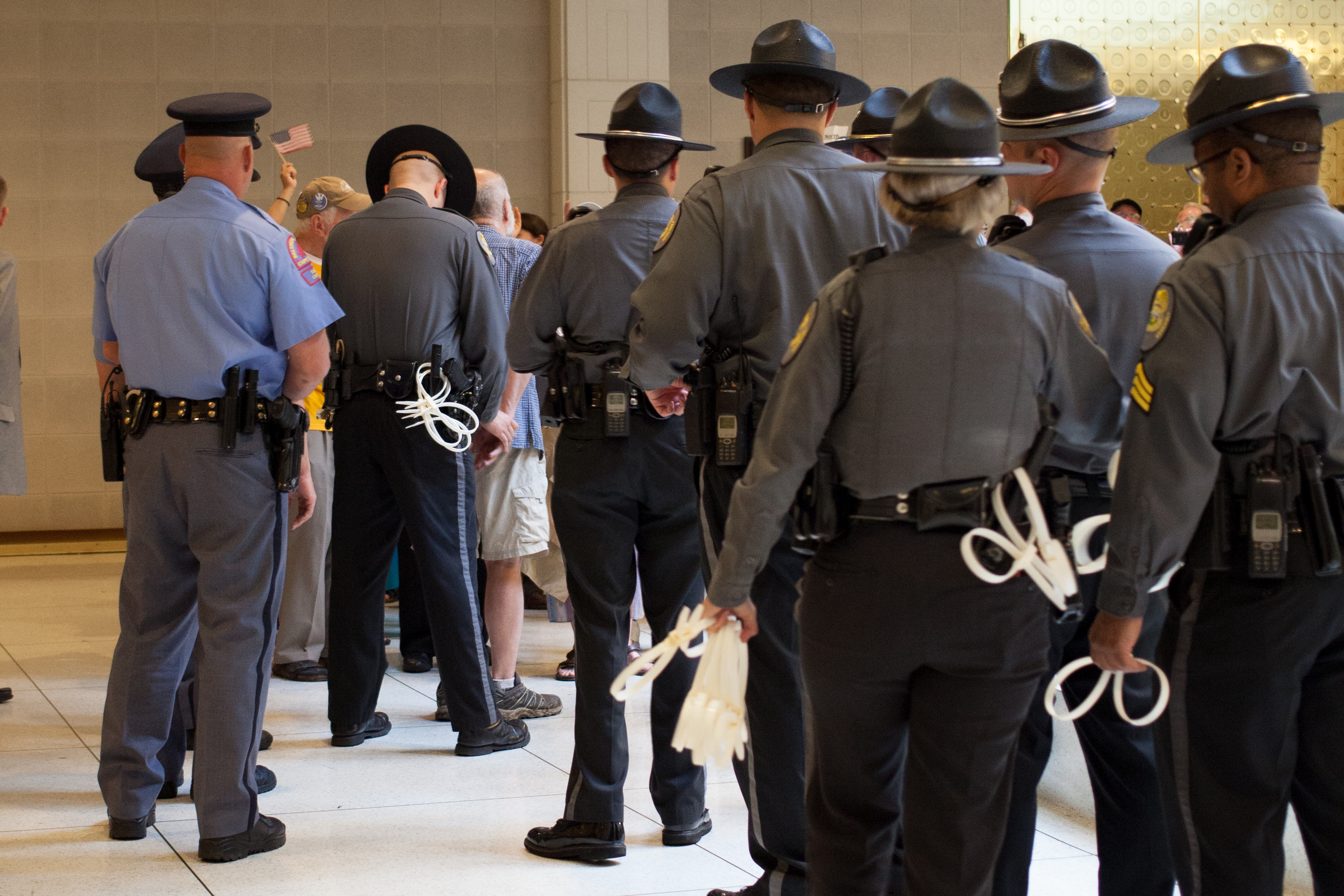The NC Council of Churches is proud to publish a brand new e-book collection of testimonies from Moral Mondays. With 32 short vignettes from North Carolinians across the state, Voices of Moral Mondays tells the story of everyday folks being motivated to speak out on account of their faith. Many, though not all, of the accounts describe what it was like to engage in civil disobedience and be arrested by the authorities. Click here to download the free e-book.
By Betsy Crites, Durham
After attending several Moral Monday protests at the NC Legislature, I finally decided to join the ranks of those who “trespass” and “fail to disperse on command.” I was by no means a groundbreaker. I may have been the 800th to face this encounter with the law while expressing disagreement with policies that punish the poor and reward the wealthy.
On top of refusing federal unemployment benefits and Medicaid to people who are economically vulnerable, our legislators are setting up obstacles to voting that will cost millions of dollars to enforce while disenfranchising those who fail to jump the additional hurdles.
One branch of the path is to risk arrest as a consequence of defying the police request to leave the building where we most want to make our voices heard.
Those who object to this flood of extreme legislation have sought ways to respond. The NAACP, a major force in North Carolina ever since Rev. William Barber found his voice, opened a dynamic but carefully managed path for our anger, Moral Mondays.
One branch of the path is to risk arrest as a consequence of defying the police request to leave the building where we most want to make our voices heard.
In preparation, my internal work was to understand my anger, recognizing my own failings, and cultivating feelings of compassion toward our elected leaders. They love their families and experience doubt and frustration like all of us. I value and respect them as persons. It is their policies that I object to so strongly. This central tenet of nonviolence, to separate the behavior from the person, takes practice.
During the civil disobedience and arrest, of course, those officials were nowhere in sight. Instead, my attention was focused on staying cheerful through the long hours of processing, being stoic with the pain in my handcuffed wrists, and trying to exude calm for my co-arrestees. At times, I admired the professional, sometimes thoughtful treatment, and silent restraint of the police going through their paces.
The day after, I thought more about the hot, dark fortress-on-wheels they called a bus, which transported us from the Legislature to the detention center. The locked bus windows were reinforced with heavy metal mesh. I recalled my shock at being shackled together with six others to walk 100 feet to a waiting room.
Next we moved to holding cells. They were clean and had painted cement benches. On one wall was a stainless steel toilet and attached sink-fountain.The cell had large windows so if we needed to relieve ourselves it would be in full view of our cellmates and the staff in the hallways. Security overrides dignity in jailhouse architecture.
Of the 101 people arrested that Monday night, I just happened to be the last to walk through the detention center door at 11:30 p.m. During those hours, I met teachers, a school counselor, a social worker, a professor, an art gallery owner, a college student, and several retirees and grandmothers like myself. A teacher arrested with me said she could not face her students as a presumed role model if she didn’t stand up for better public schools.
One woman told me her son depends on Medicaid to get his medications for mental illness. She is unemployed. While we waited, in fact, we witnessed a red-faced barefoot woman scream and rage against her detention, frantic at being restrained. We guessed that she must be on drugs or perhaps off her medications. Families losing their jobs and their safety net have few resources to handle such problems. I fear that the punitive policies we object to will lead more people on the path to detention centers, but they won’t get out the same night.
My own thoughts were of my three little grandchildren who will face more crowded classrooms, declining universities, and job insecurity. If they have the misfortune of ill-health and/or unemployment, their home state will not help them and will even block the federal government from helping them. If they have a learning disability or behavior disorder, their schools will have fewer staff to intervene and support them.
Those of us arrested are privileged in a way. Most are still in the middle class and have never been arrested, but we are by no means immune from the effects of this legislature’s policies.
Rev. Barber called on us to “stand our ground,” playing on the meaning of the infamous Stand Your Ground law that justified the killing of young Trayvon Martin.
I felt the power of those words. We were standing our ground out of love and concern for young people of color, like Trayvon, who face racism every day on the streets and in the incarceration system, for teens who can’t afford college and can’t find a job, for the 500,000 poor who will be denied even the minimal health care of Medicaid, for the women who won’t have a choice about their own health and well-being, and more.
We were standing our ground for everyone’s children and grandchildren, and for ourselves, lest we all be swept away in the rush to regress.

